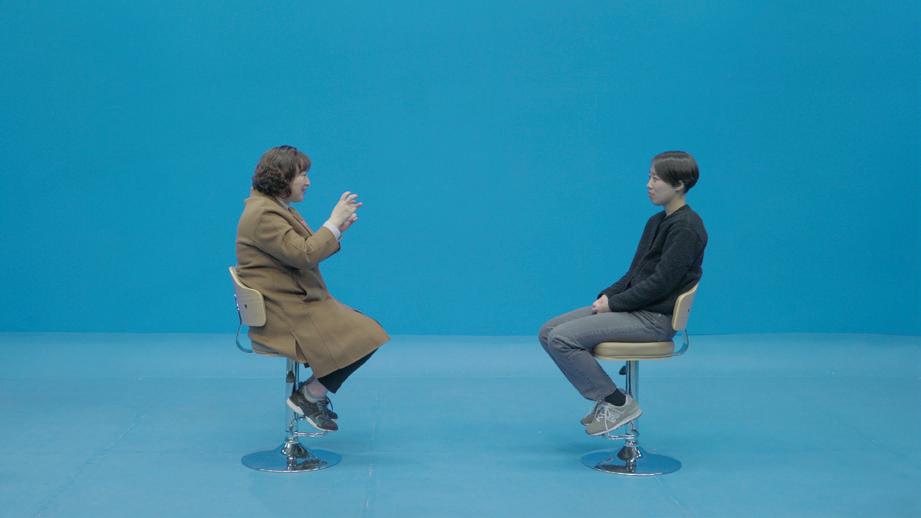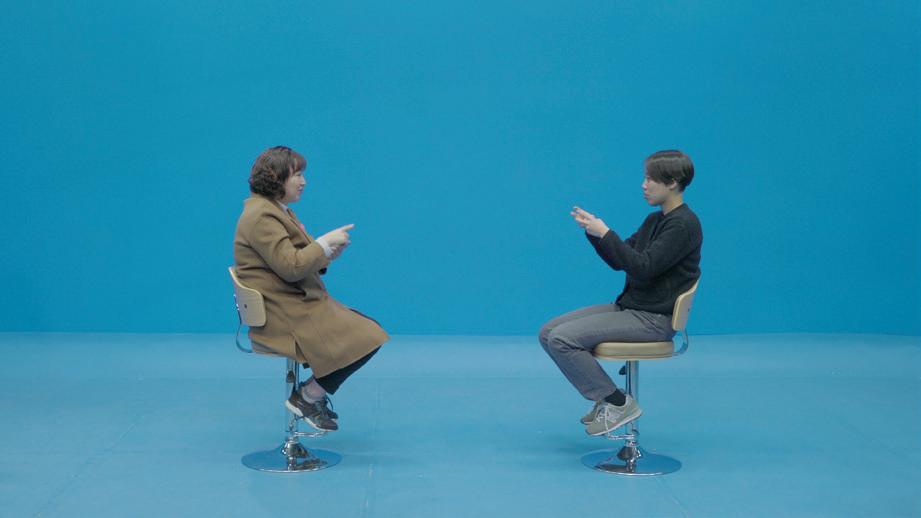
5 minute read
BORA LEE-KIL
(RE)WRITING HISTORY THROUGH GESTURE AND BODY MOVEMENT
READING THE SILENCE AND MEMORIES OF OUR BODIES
Bora Lee-Kil is a South Korean writer and filmmaker who believes that being born to and raised by deaf parents has given her the best gift of storytelling. She dropped out of school at the age of sixteen and traveled South East Asia for 8 months. This experience inspired her first film, Road-Schooler (2008) which also resulted in a book, Road is School (2009). Following this, she studied filmmaking at Korea National University of Arts. Glittering Hands (2014) is an award-winning documentary based on her stories of growing up moving back and forth between two worlds – one of silence and one of sounds. Her recent feature film, A War of Memories received the jury’s special mention for the Mecenat Award at the Busan International Film Festival in 2018. She also won the Korea Emerging Women’s Culture Award in 2015.
www.boraleekil.com
My first language is sign language. My parents spoke with their hands and facial expressions, not with their lips. I learned it from them. Later, as I grew up, I came to learn spoken language. The Republic of Korea, otherwise known as South Korea is a totalitarian and patriarchal society. Being like others is a virtue. Being different means being excluded. Thus my parents weren’t called deaf but “disabled” to emphasize that, in the eyes of Koreans, they are physically defective. My parents’ language isn’t a “language”, in the eyes of the outside, but a “gesture” denoting their shortcomings. To me, however, the words of gestures and facial expressions are more important than spoken or written words.
Suffering first from Japanese control and then from the invasion of the Western world, South Korea had to devote itself to the fate of the community as a whole rather than to that of individuals. The country united and rebuilt itself under the ideology of nationalism and collectivism, thus overshadowing any focus on or space for the individual. As the economic situation stabilised after the 1970s, Koreans entered a transition period in which people started to recover their individual selves. As they’d never had a government interested in anything other than the economy, however, they united around the family as source of meaning and support. Korean collectivism as an ideology of community based on the family; a community in which the logic of nation and family are inseparable. In Korea, there’s no place for the individual; an individual is his family.
I have always been interested in memory, and within this particular social-political context, in the memory of those whose voices do not resound in the official, patriarchal language - the voices, for example, of women and deaf people. Their memories, their experiences are irrelevant, do not exist. They are different, not part of the national collective memory. PLEDGE OF ALLEGIANCE Single channel video | 3min 54sec | HD | Color | 2018 Wherever you go as a Korean, your body remembers How come these experiences are excluded from our collective memory, why are they merely personal, individual? Why are they silenced? What does their silence imply?
As a child of deaf parents, and as a woman, I experienced that silence too. The language taught in school and society didn’t allow me an understanding of my experience. So I understand what it means not to be heard. Which is why, in my work, I focus on revealing people’s silences, and, more recently, on the memories and language that are inscribed in their bodies.
I started my research into the ways in which history and experience are inscribed into the body by focusing on my own body - as it is the easiest to approach and the most familiar, although I actually never looked at it. I started to ‘read’ the socio-political history in the movements of my body, seeing that the ideas and mechanisms of state and society have become my body’s memory. I examined, in film, how the state is present in my individual movements and gestures and how I can understand the working of power by taking a closer look at how I use, regard and move my body. At the same time, the silence, and the hidden, personal memories that cannot be spoken about and thus have no place in the collective memory, are equally inscribed in the body. The body thus is
a space and expression of multiple forces and histories.
Director / Editor Bora Lee-Kil



When I was young, my teacher used to assign us the task of filling a piece of paper with very small letters. It was both a way of learning and of punishment. It’s called ‘Black Paper’.

Director / Editor Bora Lee-Kil Cinematographer Sojin Kwak Assistant Director Ken Tanaka

RESEARCH PUBLICATION: MY EMBODIED MEMORIES Book | Work in progress | Color | English | 2019
The book documents the research into the way in which the body is a political medium. Using three projects - Pledge of Allegiance, Black Paper and Our Bodies - it discusses the historical and political contexts that the movements and gestures which my body remembers, are based on. The book also acts as a proposal for Our Bodies as an ongoing research and film project.

Author Bora Lee-Kil Desiger Louis Hothothot Proofreader Andrew Jensen, Michael Dale Morgan
OUR BODIES Screening version: Documentary | Work in progress | HD | Color | 2019
Exhibition version: Single channel video | HD | Color | 2019

I had an abortion. My mother had abortions. My grandmother had abortions, too. Why can we not share this experience?
Director Bora Lee-Kil Featuring Imsoon Jeong, Kyunghee Kil, Bora Lee-Kil Cinematographer Sojin Kwak Camera team Sojeong Lee Editor Stella van Voorst van Beest, Bora Lee-Kil Location support Community Media Center in Daejeon Thanks to Agnese Cornelio, Áron Birtalan, Sangkuk Lee, Ken Tanaka

POST SCRIPTUM

On April 11, 2019, the Constitutional Court of South Korea ruled that the current criminality of abortion is incompatible with the country’s constitution. By 2020, the South Korean government must revise its laws on abortion. Nevertheless, talking about abortion is still taboo in Korea.
Agnès Varda talked about women’s bodies and reproductive rights in her short film Women Reply (1975) and again in her film One Sings, the Other Doesn’t (1977). It’s now 44 years later and the (female) body is still a contested site, a space imprinted by power and politics. My artistic research focuses on reading that space and the process of reproducing the social-political through the body and the need to try counter or to rewrite it.

